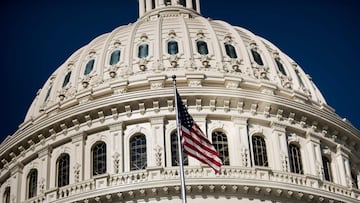Biden Tax Plan VS Trump's: What new credits and breaks are being proposed?
To get the US economy back to pre-pandemic levels Biden plans to implement new tax credits and reverse some of the tax cuts passed under President Trump.


During President Biden’s first joint address to Congress this week, he outlined the next set of legislative proposals he has sent to lawmakers. Two proposals, in particular, the American Jobs Plan and the American Families Plan, include changes to the US tax code that could impact millions of families in the United States.
Republican support for these initiatives is scarce as the proposals call to reverse many of the tax cuts passed under President Trump. The two parties have different theories of change regarding taxation, with Republicans believing that lower taxes on the wealthiest earners and businesses help them employ more people and grow their operation.
However, with millions across the country slipping into poverty during the pandemic, Democrats are pushing to increase the corporate tax rate to pre-Trump level and increase taxes for individuals making more than $400,000 a year to cover the costs of their proposals.
President Biden in the next few days will unveil eye-popping new tax rates for the wealthiest Americans —a top marginal income tax rate of 39.6% and a capital gains rate of 43.4%. https://t.co/BmIB8YFwiP
— Axios (@axios) April 23, 2021
Tax breaks and credits for corporations and individuals
The most significant decrease included in Trump’s tax cuts passed in 2017 went to corporations. Under the law, the tax rate for corporations was brought down to twenty-one percent, from thirty-five percent.
Estimates on the fiscal implications of this policy have varied widely, with the Joint Committee on Taxation estimating that it could deprive the federal government of over a trillion dollars over five years. Still, the same report highlighted that the changes could lead to increases in employment as corporations, now paying less money in taxes, could contract more workers. With millions of workers losing their jobs during the pandemic and many businesses scaling back hiring, the impact that the tax cuts could have had on employment is hard to evaluate.
Income brackets
For average earners and families, the law lowered the marginal tax rates slightly but did not make much of a difference in the amount paid by most people because deductions were stripped for the federal tax code. For example, individuals making less than $82,000 a year saw their tax rate decrease from twenty-four percent to twenty-two. Biden has not stated that he plans to increase individual tax rates back to the levels before the Trump taxes were cut.
Extension of the child tax credit
The American Families Plan would also extend the child tax credit passed through the American Rescue Plan through 2025. Before the American Rescue Act was passed, the child tax credit in the US was worth up to $2,000 per child. The value has been increased to $3,600 for children under six and $3,000 for those older. Studies have shown that this increase could cut child poverty in the United States in half.
As the child tax credits were initially passed under the American Rescue Plan, starting in July, families can expect $300 per child for children under six and $250 per child over six. There are no limits on the number of children eligible to be counted as long as a family’s income falls under the established cap of $75,000 for a single filer or a joint income of up to $150,000 for married couples. For example, a family meeting the income requirements with three children, one older than six and two younger, would be eligible to receive $850 a month between July and December. To receive the remaining credit, families will claim when filing their federal income taxes in 2022.
How Biden hopes to pay for his proposal
Richest 1% in US -- w/ median income of $~2.1 million -- would pay average of ~$100K more per yearr in taxes under Biden families plan
— Jeff Stein (@JStein_WaPo) April 29, 2021
For top 1%, taxes as % of income would go up by ~5%
For bottom 99%, roughly 0% increase in taxes as % of incomehttps://t.co/j8u8EVFMtH
Related stories
Biden’s proposals total more than 4 trillion dollars in new spending, and he has proposed increasing taxes on corporations and wealthy individuals to cover the cost. In an attempt to fulfill a campaign promise, he has stated that no one making under $400,000 a year will see an increase in their taxes to cover the costs of these proposals.
The American Families Plan is also unique in that it allocates federal funding to support the IRS in investigating tax evasion by corporations, businesses, and wealthy individuals. Citing a recent study, the White House stated that the top one percent of income earners “failed to report 20 percent of their income and failed to pay over $175 billion in taxes that they owed.” In the digital age, it is becoming easier to hide assets in overseas accounts and because the tax code is outdated, the government is not entitled to information on these transactions. President Biden hopes to combat this issue by modernizing the tax code and by giving the federal government more access to financial information from the nation’s wealthiest. Together with these policy proposals and others, the administration estimates that they could increase federal revenues by 1.5 trillion dollars over the next decade.

